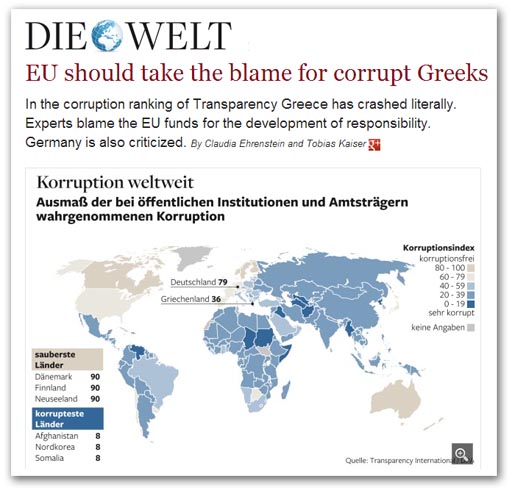06/12/2012
I've always felt that the real issue with Greece and like economies is corruption, and have
previously remarked on its importance, calling it a "killer of nations". No modern economy or democracy can function properly if it is fundamentally corrupt.
It is good to see, therefore, the German press take on board Transparency International's (TI) "corruption perceptions index" for 2011, finding that Greece ranks 94 globally, down from 80 the previous year), making it the most corrupt country in Europe â alongside Bulgaria, Romania and Italy.
But one cannot help but note the difference in tone, with the likes of
Die Welt firmly pinning some of the blame on the EU, making available its funds and large projects without proper controls.
By contrast, no such thought taints the loss-making
Guardian, which focuses on "30,000 homes a day cut off for unpaid bills by the state", telling us that "corruption has become a matter of survival for many Greeks".
However, Transparency International's annual list is not a direct measure of corruption and graft in each country. That information,
Spiegel tells us, is difficult to access due to the secret nature of such deals.
Instead, the index seeks to measure the perception of corruption in each country, which is fed by a lack of public auditing, coziness between government officials and large companies, bribery in public tenders, political party financing and tax evasion, among other factors.
In particular,
Spiegel points to "corrupt politicians" and the rich continuing to help themselves to Greece's funds, with little being done about it.
Interestingly, the personal corruption that the
Guardian chooses to feature does not feature prominently in Transparency International calculations, but it serves to keep the EU out of the picture, allowing the paper to avoid criticising the object of its affection.
At least, though, the
Guardian does feature the report reasonably prominently, which cannot be said for the British media across the board. In some ways, this is unsurprising, as corruption in Greece is something of a "dog bites man" story. However, TI notes that Greek people live in a state of "corrupt legality", meaning that the law often condones or even fosters corrupt practices. Corruption is endemic: not limited to any party or social class, nor to the public sector".
That we have a
failed state in our midst, is important though, and should be an important issue when it comes to deciding whether we want to be part of a political construct that harbours such a country.
Rampant out-of-control corruption is not a model we want to be too close to â our politicians and public servants need little encouragement as it is.
COMMENT THREAD

